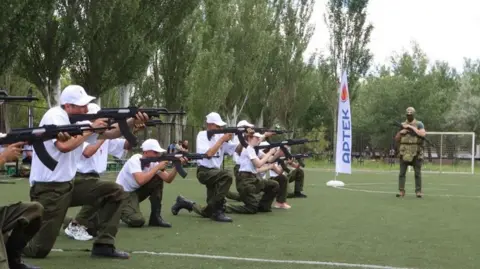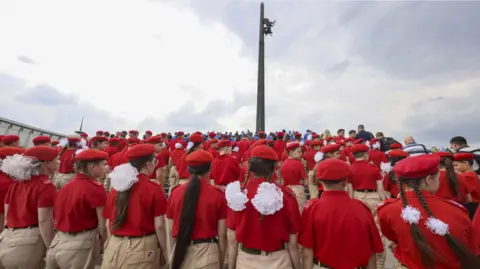
 Yunarmia branch of the Zaporizhzhya region
Yunarmia branch of the Zaporizhzhya regionBeing taught to love Russia starts early for children in occupied areas of eastern Ukraine.
At a nursery school in Luhansk, more than 70 youngsters line up holding a long black and orange Russian military banner in the shape of a letter Z, the symbol of Russia's invasion of Ukraine.
Across the city, seven little girls jump up and down and gesture in front of a Russian flag to the brash song "I am Russian" that blares out of loudspeakers. When the music stops they shout out together: "I'm Russian."
In an occupied town called Anthracite, nursery school children have made trench candles and blankets for Russian soldiers.
It is all part of a campaign that seeks not only to erase Ukraine's national identity, but also turn young Ukrainians against their own country.
To do that with children you need teachers, and as many Ukrainian teachers have fled, the government in Moscow has begun offering lump-sums of 2m roubles (£18,500) to Russian teaching staff willing to relocate to occupied parts of Ukraine.
The biggest and most powerful Russian organisation involved with children is Yunarmia (Youth Army).
Affiliated with the Russian defence ministry, it accepts members as young as eight. It operates across all of Russia, and now has branches in occupied areas of Ukraine.
"We're providing children with some basic skills which they'll find useful should they decide to join military service," says Fidail Bikbulatov, who runs Yunarmia's section in occupied areas of the Zaporizhzhia region in south-east Ukraine.
Bikbulatov was deployed from Russia's Bashkortostan, where he headed the "Youth Guard" division of the ruling United Russia party.
 Yunarmia branch of the Zaporizhzhya region
Yunarmia branch of the Zaporizhzhya regionThe EU has sanctioned Yunarmia, and Bikbulatov personally, for "the militarisation of Ukrainian children". Yunarmia is also targeted by UK sanctions for being part of Russia's campaign of "brainwashing" Ukrainian children.
Yunarmia is not alone. Other Russian state-sponsored organisations that have moved in include "Movement of the First Ones" and "Warrior", a network of centres for "the military and athletic training, and patriotic education of young people" set up on Russian President Vladimir Putin's orders.
These groups organise competitions such as Zarnitsa games rooted in the Soviet era, where Ukrainian children are required to demonstrate "general military literacy, knowledge of Russian statehood and military history, firearms firing skills".
As the children progress through the education system, they are taught in Russian, using the Russian curriculum and textbooks that justify Russia's war against Ukraine.
One such book portrays Ukraine as little more than a Western invention created to spite Russia, and argues that human civilisation would have possibly ended had Russia not invaded Ukraine in 2022.
Lisa, who attended a school in occupied Donetsk, says students there were forced to take part in events celebrating Russia and the USSR.
"When they were preparing a parade of some sort, I, the whole of my class and the whole of my year were forced to attend every weekend and train. We had to hold posters. I could not say no, it wasn't my choice. I was told I had to do it to graduate," Lisa says.
"Every time lessons started, our teacher made us stand up, put a hand on our hearts and listen to the Russian anthem, which she made us learn by heart, too."
Lisa now lives in the US and has been posting about her experiences on TikTok.
 EPA
EPAServing Russian soldiers also play a role in the campaign of indoctrination, visiting schools to give so-called "bravery lessons". They glorify their exploits at war and depict Ukrainian forces as violent, unruly neo-Nazis.
Pavel Tropkin, an official from the ruling United Russia party now based in the occupied part of Kherson region, says these lessons are held "so that children understand the objectives" of what the Kremlin calls "the special military operation" in Ukraine.
Outside school, Ukrainian children are taken to see specially organised exhibitions glorifying Russia and the "special military operation".
One centre catering for such trips is hosting exhibitions called "Russia - My History" and "Special Military Operation Heroes" in Melitopol in Zaporizhzhia region.
The trips do not stop there.
The Kremlin has also launched a big campaign to take Ukrainian children on tours of Russia as part of efforts to instil pro-Russian sentiments.
Russia's culture minister Olga Lyubimova claims that more than 20,000 children from occupied Ukrainian territories have been taken to Russia under one programme alone, called "4+85". According to the Russian government's concert agency Rosconcert, which runs the programme, it seeks to "integrate the new generation into a unified Russian society".
However, Russia's "integration" campaign goes far beyond indoctrination.
Thousands of Ukrainian children taken to Russia during the three years of the full-scale invasion have not been allowed to return.
According to the Ukrainian government, more than 19,000 Ukrainian children have been forcibly deported to Russia. The UK government estimates that some 6,000 Ukrainian children have been relocated to a network of "re-education camps" in Russia.
International humanitarian law bans activities like this. For example, the Fourth Geneva Convention says that an occupying power may not enlist children "in formations or organizations subordinate to it" and that it may apply "no pressure or propaganda which aims at securing voluntary enlistment" of locals in occupied areas into its armed or auxiliary forces.
In 2023, the ICC issued an arrest warrant for President Putin, in part for the unlawful deportation of children. Putin and his government deny the charges.
Waging its war on Ukraine, Russia is not only after territory. It is also trying to put its stamp on the people who live there, no matter how young they are.

10 PerFlyer

5 PerFlyer